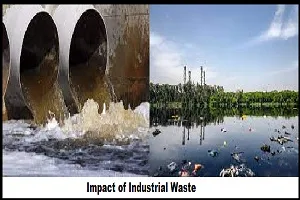In modern society, industrialization has brought about remarkable advancements, but it has also led to the generation of substantial amounts of waste. Industrial waste, characterized by its diverse composition and often hazardous nature, poses significant environmental challenges. From polluting water bodies to harming ecosystems and human health, the repercussions of improper industrial waste management are profound and far-reaching.
One of the most pressing concerns surrounding industrial waste is its impact on water resources. Many industries discharge untreated or poorly treated wastewater directly into rivers, lakes, and oceans. These effluents often contain toxic chemicals, heavy metals, and other pollutants that can contaminate aquatic ecosystems. In addition to harming aquatic life, polluted water sources can endanger human health through the consumption of contaminated fish and water for drinking and irrigation.
Moreover, industrial waste contributes to soil degradation and contamination. Improper disposal of hazardous waste materials such as heavy metals, solvents, and pesticides can lead to soil pollution, rendering land unfit for agriculture or other purposes. Contaminated soil not only affects plant growth but also poses risks of groundwater contamination, further exacerbating environmental issues.
The atmospheric impact of industrial waste is equally significant. Industrial processes release various pollutants, including greenhouse gases, particulate matter, and volatile organic compounds, into the air. These emissions contribute to air pollution and climate change, posing health risks to nearby communities and ecosystems while exacerbating global environmental challenges.
Furthermore, the accumulation of industrial waste can have long-term consequences for biodiversity and ecosystem stability. Pollutants discharged into natural habitats disrupt delicate ecological balances, leading to declines in species populations and biodiversity loss. Additionally, the persistence of certain chemicals in the environment can bioaccumulate in organisms, potentially reaching toxic levels and threatening entire food chains.
The socio-economic ramifications of industrial waste cannot be overlooked either. Communities residing near industrial facilities often bear the brunt of environmental pollution, experiencing adverse health effects, reduced property values, and limited access to clean water and air. Moreover, the costs associated with remediation efforts and healthcare expenses place a burden on both local governments and affected individuals.
Addressing the challenges posed by industrial waste requires concerted efforts from governments, industries, and society as a whole. Implementing stringent regulations and enforcement mechanisms to monitor waste disposal practices is essential for preventing environmental degradation. Encouraging the adoption of cleaner production techniques and promoting resource efficiency can minimize waste generation at its source.
Moreover, investing in research and innovation to develop sustainable waste treatment technologies is crucial for mitigating the impact of industrial waste. Adopting circular economy principles, which emphasize the reuse, recycling, and recovery of materials, can help reduce the reliance on virgin resources while minimizing waste generation and environmental pollution.
Ultimately, recognizing the interconnectedness of environmental, social, and economic factors is paramount in addressing the challenges associated with industrial waste. By prioritizing sustainable practices, fostering collaboration among stakeholders, and promoting environmental stewardship, we can strive towards a future where industrial development coexists harmoniously with environmental preservation and human well-being.
Facts about the impact of industrial waste
Facts about the impact of industrial waste, among others:
1. Industrial waste contributes to approximately 70% of all water pollution globally, endangering aquatic ecosystems and human health.
2. Soil contamination from industrial waste affects over 2.5 billion acres of land worldwide, jeopardizing agricultural productivity and food security.
3. Air pollution caused by industrial emissions leads to an estimated 4.2 million premature deaths annually due to respiratory illnesses and cardiovascular diseases.
4. Nearly 90% of marine litter is comprised of plastic waste, much of which originates from industrial activities, threatening marine biodiversity and ecosystems.
5. The economic costs of industrial pollution exceed $4.6 trillion per year, encompassing healthcare expenses, environmental remediation, and loss of ecosystem services.
6. Industrial waste dumping is a significant contributor to the decline of over 13,000 species worldwide, highlighting its profound impact on global biodiversity.
7. Heavy metals like lead, mercury, and cadmium, commonly found in industrial waste, pose severe risks to human health, causing neurological damage, organ failure, and developmental disorders.
8. Acid rain, a consequence of industrial emissions, damages ecosystems, corrodes infrastructure, and contaminates water sources, further exacerbating environmental degradation.
9. Industrial waste disposal in landfills produces methane, a potent greenhouse gas that contributes to climate change and global warming.
10. Sustainable waste management practices, such as recycling, resource recovery, and pollution prevention, are essential for mitigating the adverse effects of industrial waste on the environment and human well-being.
That is the article entitled The Impact of Industrial Waste on the Environment. If there are any deficiencies or errors in writing this article, the Berbagai Reviews expresses its deepest apologies. Please leave a wise message in the comments column provided. Thank you for visiting, hopefully it's useful.
Other reading materials, can help with school assignments, click Pustaka Pengetahuan
To increase insight and knowledge, please click Baraja Farm
For tutorial on how to cultivate, please click Baraja Farm Channel
Social media please click facebook




Tidak ada komentar:
Posting Komentar